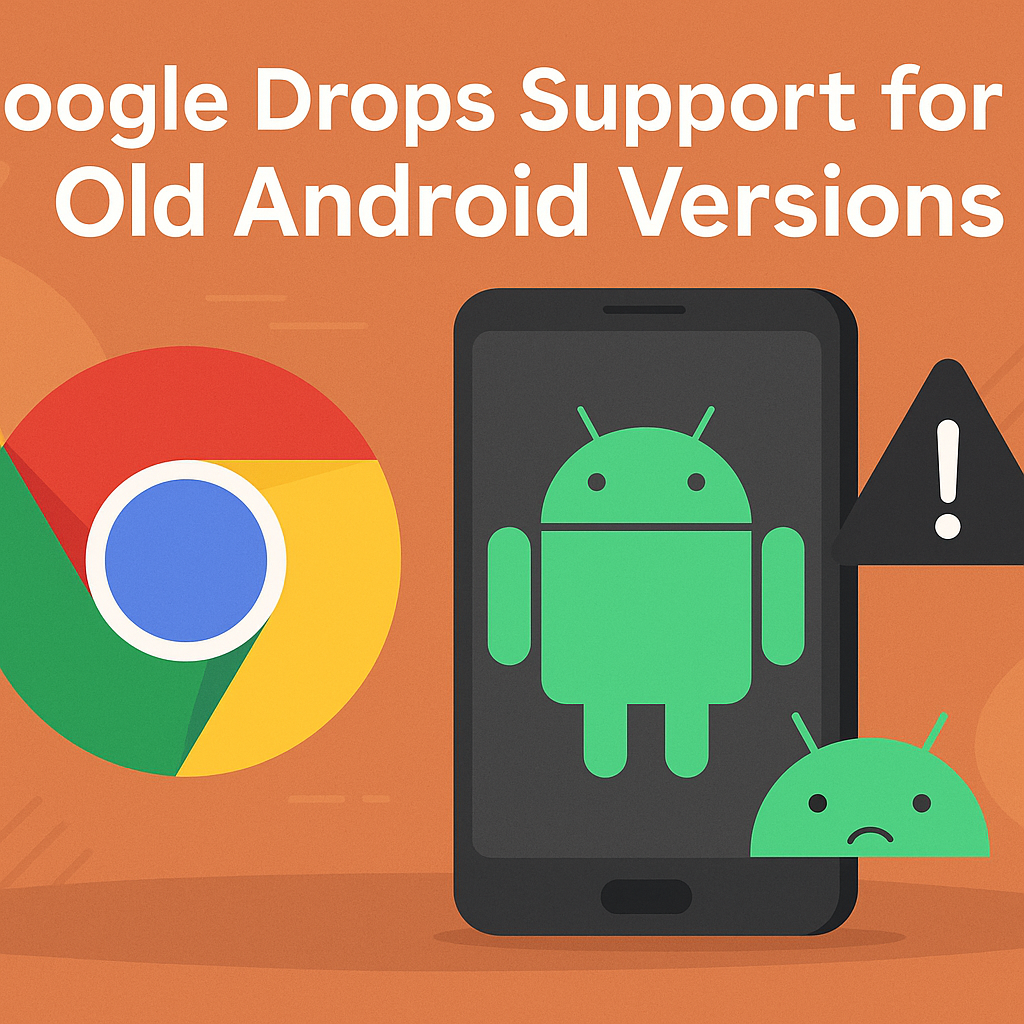Google Drops Support for 4 Old Android Versions: What You Need to Know
In a significant move that affects millions of Android users worldwide, Google drops support for 4 old Android versions, marking a major step in its software lifecycle policy. Starting August 2025, the tech giant will no longer provide Chrome browser updates for devices running Android 8.0 (Oreo) and Android 9.0 (Pie), impacting around 10% of all active Android users.
According to Google, Chrome version 138 will be the last release compatible with Android 8 and 9. From Chrome 139 onwards, users must be running Android 10 or higher to receive future updates. The decision reflects Google’s focus on modernizing its mobile browser to enhance security, improve performance, and roll out advanced features that are no longer feasible on outdated platforms.
1. What Does This Mean for Chrome Users on Older Android Versions?
The announcement that Google drops support for 4 old Android versions means that anyone still using Android 8.0 or 9.0 will no longer receive Chrome updates starting August 5, 2025. Although Chrome 138 will continue to function on these devices, users won’t benefit from security patches, feature updates, or performance improvements.
Google has emphasized that users on these versions will still be able to run the last supported Chrome version. However, without further updates, they become increasingly vulnerable to security threats and compatibility issues over time.
2. Why Google Is Ending Support for Android 8 and 9
The Android ecosystem has grown significantly, and maintaining compatibility with older versions can limit innovation. Google drops support for 4 old Android versions to streamline development, reduce fragmentation, and allocate resources more efficiently to newer, more widely used Android versions.
According to Android distribution statistics from April 2025, Android 9 powers approximately 6% of devices, while Android 8 and 8.1 collectively run on about 4%. That means nearly 10% of Android users will be affected by this change.
Both Android 8 and 9 are well past their prime. Android 8 was launched in 2017, and Android 9 in 2018. As these operating systems age, their ability to support newer browser technologies diminishes, making them impractical for a modern browser like Chrome.
3. What Happens If You Continue Using Chrome 138?
While the decision that Google drops support for 4 old Android versions doesn’t immediately make Chrome unusable on Android 8 and 9, users should understand the risks. Continued usage of Chrome 138 means:
- No future security updates, exposing users to malware and other vulnerabilities.
- No new features or UI improvements, limiting the user experience.
- Potential compatibility issues with evolving web technologies.
- Increased risk of bugs and crashes over time.
For those concerned about online safety and performance, the only viable solution is upgrading to Android 10 or newer.
4. What You Should Do Next
If your device is running Android 8.0 or 9.0, you have a few options:
- Upgrade your device to Android 10 or later if an official update is available.
- Switch to a newer device if your current one no longer receives OS updates.
- Use alternative browsers that may still support Android 8/9 (though this is only a temporary workaround).
Google clearly advises users to transition to newer Android versions to maintain access to secure and updated Chrome builds. This move aligns with the broader industry trend of pushing users toward more current and supported platforms.
5. How This Decision Impacts the Android Ecosystem
The fact that Google drops support for 4 old Android versions sends a clear signal to OEMs and developers: it’s time to sunset legacy systems. The pressure is now on smartphone manufacturers and custom ROM developers to either offer upgrades for their older models or risk seeing their user base become increasingly exposed to security flaws.
This move also reinforces the importance of timely software support. Devices that are stuck on older versions due to lack of updates now face another disadvantage—no access to an updated version of the world’s most popular browser.
6. What About Other Apps and Services?
Chrome isn’t the only app that might phase out support for older Android versions. When Google drops support for 4 old Android versions, it sets a precedent that other app developers are likely to follow. Apps with heavy performance, security, or compatibility demands are expected to gradually phase out older OS versions as well.
This domino effect could accelerate the obsolescence of Android 8 and 9 devices, nudging users and manufacturers alike toward quicker transitions to newer versions.
7. The Bigger Picture: Google’s Strategy Going Forward
The broader strategy behind why Google drops support for 4 old Android versions is about creating a leaner, more efficient Android environment. By encouraging users to adopt Android 10 and beyond, Google can better standardize its feature set, improve developer support, and roll out next-gen capabilities without worrying about backward compatibility.
For users, the message is clear: staying on older Android versions is no longer a sustainable option. It compromises your device’s security, performance, and access to essential services like Chrome.
Conclusion: Transitioning Beyond Android 8 and 9
In summary, Google drops support for 4 old Android versions, including Android 8.0, 8.1, and 9.0, beginning August 2025. While Chrome 138 will remain operational, no future updates will be provided. The move impacts an estimated 10% of Android users and signals a decisive shift in Google’s mobile software strategy.
If you’re among the affected users, now is the time to check for available Android updates or consider investing in a newer smartphone. Transitioning to Android 10 or later ensures that you stay protected and continue enjoying all the innovations Chrome has to offer.
With Google drops support for 4 old Android versions as the focal point of this update, the takeaway is simple: the future of browsing on Android belongs to those who keep their devices updated.

Photo by AS Photography

One thought on “Google Drops Support for 4 Old Android Versions: What Chrome Users Need to Know”
Comments are closed.